A Quote by David Levering Lewis
The business of return migration is a phenomenon that historians have indeed begun to look at, but it is rather an ignored and underplayed story and one that we need to know more about.
Related Quotes
Most academic historians accept that historians' own circumstances demand that they tell the story in a particular way, of course. While people wring their hands about 'revisionist' historians; on some level, the correction and amplification of various parts of the past is not 'revisionism' as it is simply the process of any historical writing.
Fortunately, both governments have been in favor of studying the Mexican migration problem in greater depth. For the first time, I think, we will have something scientifically sound that says something about this phenomenon. The study is ongoing, and I hope that, with a push from both of us, it will provide a sound basis for serious public discussion on the migration issue.
Buying a share of a good business is better than buying a share of a bad business. One way to do this is to purchase a business that can invest its own money at high rates of return rather than purchasing a business that can only invest at lower ones. In other words, businesses that earn a high return on capital are better than businesses that earn a low return on capital.
But I'd rather help than watch. I'd rather have a heart than a mind. I'd rather expose too much than too little. I'd rather say hello to strangers than be afraid of them. I would rather know all this about myself than have more money than I need. I'd rather have something to love than a way to impress you.
We don't need no more rappers, we don't need no more basketball players, no more football players. We need more thinkers. We need more scientists. We need more managers. We need more mathematicians. We need more teachers. We need more people who care; you know what I'm saying? We need more women, mothers, fathers, we need more of that, we don't need any more entertainers
But what we know, we who are either observers of a business we once were in and loved, or are people within it now, our business as a whole, when it is not obsessed with the business of business, is eaten up with a form of cultural conservatism which is truly amazing. Indeed, more often than not it is eaten up with pure reactionary-ism.
Social media is here to stay, and the social phenomenon that is bringing this about is consumers' willingness to share more about themselves, share more about what they're doing... people are even willing to disclose where they're at. And this phenomenon is going to create huge commerce opportunities on the web.
Historians will look back on this era and how the Internet changed what we value, what we consider art, the way we think, the way we define what it means to be human. In Sincerity and Authenticity, Lionel Trilling describes the changes that occurred between about 1850 and 1920, due to the Industrial Revolution and the resulting migration of people from small communities to relative anonymity in cities. Because of that paradigm shift, ideas about what it means to be an individual underwent a transformation that leeched into all areas. Art, psychology, history, marriage, gender.
I see top business schools working to bridge this gap [between academic research and business application] by respecting executive education, by having more mature students who proactively draw from faculty what they know they need, and by having faculty who are willing to leave their ivory towers for the murky world of business reality. Unfortunately, at other times, business professors have little or not interest or savvy about business issues.








































